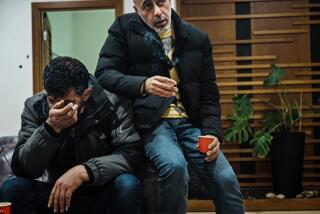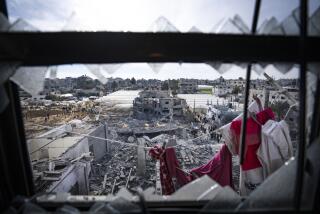Miffed Gazans Prompt Arafat to Ease Tight Security : Mideast: Even PLO chief appears dismayed by massive show of force. He heads for Jericho today.
KHAN YUNIS, Gaza Strip — In a windy graveyard that is said to house the tomb of Yasser Arafat’s father, a thin young man called Ahmed waited for hours for the Palestine Liberation Organization chairman’s motorcade to pass.
He had earlier tried to catch a glimpse of Arafat in Gaza City’s crowded main square, to little avail.
“We can only see him from far away,” he said with a shrug. “It’s not people like us who get close. The security, the police, always stop us. He has so much security.”
Indeed, for a great many Gazans, Arafat’s whirlwind tour through his homeland has been little more than a flash of a black-and-white kaffiyeh and the arm of a green combat uniform, glimpsed though a wall of Kalashnikov rifles, burly bodyguards and roaring military trucks full of soldiers.
Gaza, sullen from 27 years of Israeli military occupation, has not taken well to the sight of its returned leader buried in a military convoy.
“The issue of the army, the massive amount of police in the streets, this has to be changed. Because people psychologically hate the army,” a prominent Gaza businessman said. “And our army, they’ve been thrown all over the world and now they’re happy to be here. They make a big show of themselves, and that’s provocative for the people.”
Even Arafat appears to have been dismayed by the massive security entourage that greeted his arrival: Before his departure for the West Bank town of Jericho, the seat of government for the Palestinians’ self-rule authority, he ordered a major reduction in the uniformed military presence around him.
Arafat travels to Jericho today to swear in the new Palestinian Authority. After that, he will fly to Paris for a summit with Israeli Prime Minister Yitzhak Rabin, then return to the self-rule areas--for good--on Saturday, his aides said.
The Jericho stop will be the toughest test yet of a new security cooperation pact between Israel and the PLO. Arafat, whose arrival in the Gaza Strip on Friday ended a 27-year exile, will fly to Jericho by helicopter under the escort of two Israeli military helicopters. The Israeli army set up roadblocks Monday to keep away Jewish settlers who threatened to disrupt the visit, which is expected to draw tens of thousands of people to the sleepy oasis town.
Over the weekend, Arafat gathered his own military and police chiefs and informed them that the major duties for presidential security would immediately be transferred to the plainclothes preventive security detail.
“This came together with an instruction that says we will minimize to the maximum the number of vehicles and guards that travel with the president,” a senior security official said.
“It is a point of view of the street that was conveyed to the president--that there is no need to exaggerate the security precautions--and also Arafat’s personal assessment that he doesn’t need that much here in his homeland.”
The new security orders represent a dramatic shift in the approach toward Arafat’s visit to turbulent Gaza, a center of Islamic fundamentalist opposition to the peace agreement he signed with Israel and the home of 4,000 Jewish settlers, most of them also opposed to the peace plan.
But Arafat, apparently cheered by the enthusiastic reception he got from throngs lining Gaza’s streets, recalled Nelson Mandela’s example in South Africa and insisted on mixing it up with the masses, his aides said.
“From the first day, the security men were worried,” Arafat said in a meeting with a small group of reporters Monday. “I told them, I refuse what you are doing. I gave strict orders to stop all this. . . .
“I am not afraid of my people,” he added.
In his subsequent motorcades, Arafat has toured the streets in an open car, waving to the crowds and clutching hands as he passed by.
The public has been captivated and curious. “I was surprised how old and tired he looked,” said Mohammed Sultan, a 35-year-old construction worker in Jabaliya. “He is also quite small. I have spent my life convinced that he is a tall, strong and energetic person.”
Many rejected any idea that the PLO chairman might be risking his life by traveling through his homeland.
“If the Palestinian people didn’t want Yasser Arafat, he would have been shot as he crossed in at Rafah,” one laborer said. “Actually, we would have shot him in Lebanon. But we wanted him, and it is we who protected him going through Jabaliya.”
Some police officials expressed skepticism about the wisdom of reducing security around the PLO leader.
“Every president in the world is protected. Why shouldn’t ours be?” said one. “You can’t forget that he is the person who built the revolution, and he went on building until we got a state. And you don’t want us to protect him?”
Security officials see relatively little threat to Arafat from his crowds of supporters. In any case, they said, the actual number of guards protecting Arafat will not be reduced by much.
“In reality there is no difference between an officer who is in uniform and one who is not,” one official said. “However, our people at large feel more comfortable with people who are not wearing uniforms. It is not the time for intimidation.”
More to Read
Sign up for Essential California
The most important California stories and recommendations in your inbox every morning.
You may occasionally receive promotional content from the Los Angeles Times.










